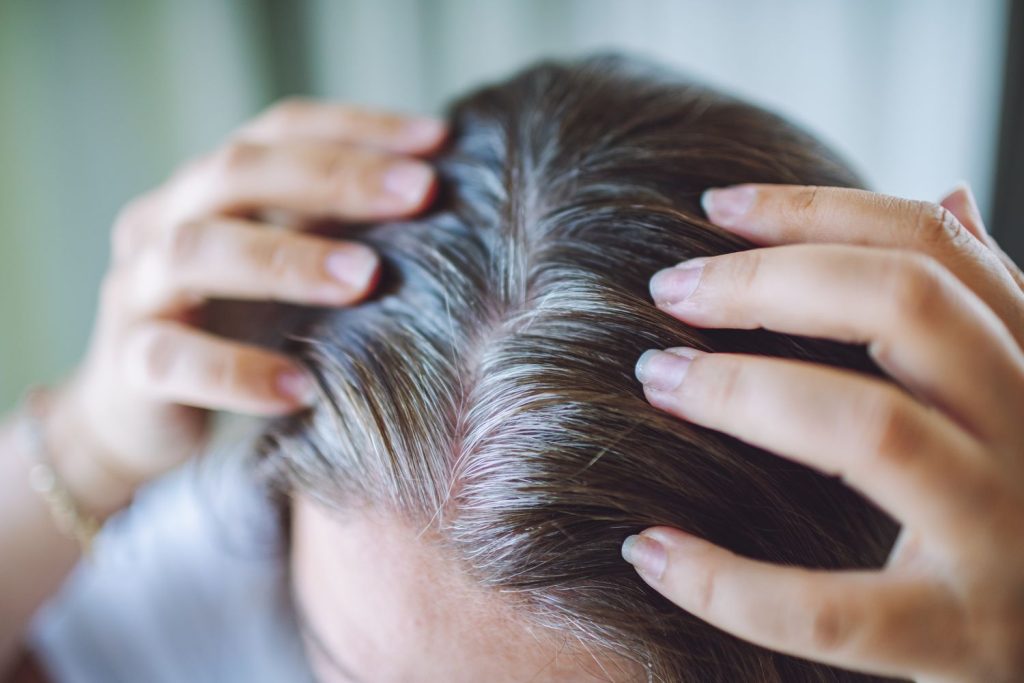:max_bytes(150000):strip_icc():format(jpeg)/GettyImages-1496184322-bcf8ff830c444ae8a87ce61cee502721.jpg)
Healthy hair starts with a healthy scalp. The foundation of good hair care is knowing your hair type and choosing products that nourish and protect the scalp without causing irritation.
While there is no quick fix for a healthy scalp, a consistent routine with the right products can help restore balance and moisture to a dry scalp.
1. Know Your Hair Type
Different types of hair require different care. For example, people with straight or fine hair may need to wash their hair daily, while those with coarse, curly, dry, and textured hair may require less frequent washing.
2. Find the Root Cause
Treating a dry scalp isn’t always as easy as adding a new conditioner or serum to your routine. Several medical conditions could cause scalp dryness, such as:
- Psoriasis is a chronic autoimmune condition that causes your scalp to overproduce skin cells, creating painful plaques with flaking skin.
- Seborrheic dermatitis is a form of eczema that often affects the scalp. A combination of genetics, Malassezia yeast, fungal infection, and an overactive inflammatory response causes it. People with this condition usually notice itching, flaking, and scaly patches that form over oily skin.
- Tinea capitis, also known as scalp ringworm, is a fungal infection of the scalp that causes scaly patches, flaking skin, inflammation, and even hair loss.
- Actinic keratosis is a type of precancerous sun damage most common in older individuals. It leaves the scalp bumpy, coarse, and dry.
Some holistic and home remedies can help soothe these conditions, but involving a healthcare provider like a dermatologist may yield better results.
3. Avoid Harsh Products
Not all hair products are designed to enhance your scalp and hair health. Dyes, bleaches, and other products with harsh chemicals can damage hair and dry your scalp. Even hair products aimed at treating dry scalp can worsen dryness if you react to any single ingredient.
4. Consider Your Shampoo Choice
Some shampoos contain chemicals to help you achieve a particular style or color. However, these harsh ingredients can negatively affect your scalp health. Moisturizing and gentle shampoos can reduce irritation and add vital nutrients and hydration to reduce scalp dryness.
Some people use dry shampoo between washes to reduce oil build-up. However, these products are only designed to absorb oil, not to clean the hair or scalp. Over time, dry shampoo, dead skin, and other debris can build up around the roots of your hair and do more damage than good. If you use dry shampoo, wash your hair and scalp often to clean them thoroughly.
5. Exfoliate Your Scalp Regularly
Your scalp produces oils and sheds dead skin cells, just like the skin on the rest of your body. You can develop irritating build-up without effectively clearing this debris from your scalp.
Emollients are products designed to clear dead skin and provide chemical exfoliation. While these products can be helpful, they may also irritate the scalp. Manual exfoliation—or scrubbing your scalp while shampooing—can help clear oil and skin build-up that can lead to itching and flaking.
6. Try a Rich Conditioner
No matter your hair type or what products you use, your scalp can still lose moisture. Dry hair, a hot climate, and other unavoidable factors can dry your skin and scalp. Replacing lost moisture in your scalp is essential, but creams and lotions that you use on your skin may not work with your desired hairstyle.
Conditioners, hair masks, and other products designed to hydrate hair and scalp can add hydration without diminishing your hair’s appearance.
7. Massage in Oils
Like conditioners, oils designed for hair and scalp care can help add moisture to your skin and restore the skin barrier of your scalp. While a strong skin barrier is vital to skin and scalp health, it’s important to consider your hair type before adding oils. Adding more oils may not be the best choice if you already have an oily scalp.
If you do use oils to moisturize your hair and scalp, be careful where you apply them, and look for simple, natural oils like:
Each of these oils has specific uses and benefits, which you should consider based on your hair type and scalp condition.
8. Apply a Scalp Serum or Lotion
Like conditioners and oils, serums and lotions designed for hair care can add moisture to your scalp. The key to using serums and lotions is to look for products designed to restore balance and strengthen the skin barrier. These serums usually contain probiotics, vitamins, natural oils, proteins, and other nutrients.
9. Use a Scalp Brush
Scalp brushes and massagers are designed to exfoliate your scalp, which can help support overall skin health. But there are other benefits, too. Research suggests that scalp massage can help promote circulation, increasing blood flow to your scalp. This increased blood flow brings moisture and nutrition to the scalp and can improve skin health and help promote hair growth. As another bonus, studies show that scalp massage can reduce stress and feel good.
10. Avoid Heat Styling and Hot Showers
Heated styling tools and hot water used for shampooing can remove moisture from the scalp, leading to dryness and irritation. Experts suggest using only warm water to wash your hair and using heat styling tools sparingly, especially if you already have scalp dryness or irritation.
11. Keep Dandruff Under Control
Dandruff is a condition in which oils and debris build up on the scalp, causing skin to flake off and become visible in the hair. While oil is sometimes a good choice for scalp care, the overproduction or build-up of oils on the scalp can have the opposite effect. Regular washing and using shampoos and hair care products designed to treat dandruff can help soothe your skin and restore scalp health.
12. Other Home Remedies
Many natural products you may already have at home can help you improve your scalp health. These items focus on restoring moisture, exfoliation, balancing your skin’s chemical composition, delivering nutrients, and strengthening your skin barrier. Some examples of home remedies for a dry scalp include:
- Aloe vera
- Apple cider vinegar
- Baking soda
- Colloidal oatmeal
- Green tea
- Lemon juice
- Neem oil
- Orange peel
- Peppermint oil
- Rosemary oil
Finding the proper home remedy for your specific skin and hair type may require some trial and error, but the appeal of these items is that they are readily available and budget-friendly.
When to Contact a Healthcare Provider
If you experience severe pain, inflammation, or bleeding, your problem might not be as simple as a dry scalp. A dermatologist can help guide you to the right treatments and potentially identify other underlying conditions contributing to the problem.
Summary
Many shampoos, hair masks, conditioners, serums, and even basic kitchen ingredients can help reduce dryness and improve scalp health. None of these will work overnight, and you may need to consider multiple fixes—exfoliation, adding moisture, and using less heat styling—to see results.
If you have tried to treat your dry scalp with no improvement, or if you experience bleeding or pain, talk to a healthcare provider about additional treatment options and other conditions that could be causing your dryness.








